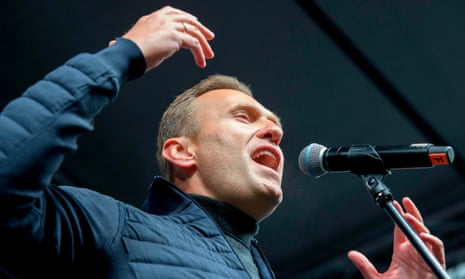Tens of thousands of demonstrators have rallied in Moscow to call for an end to prosecutions tied to this summer’s mass protests, as Russia’s opposition seeks to maintain its momentum after the largest anti-Kremlin demonstrations in years.
Russian police estimated at least 20,000 protesters – and organisers said the numbers were higher – joined the sanctioned rally on a drizzly autumn Sunday to listen to speeches attacking the political crackdown amid chants of “let them go”.
The protests gathered members of diverse political movements, including liberals, libertarians, leftwingers and students. Protesters carried signs with slogans including “freedom to the students, freedom to the universities” and “you don’t have enough prisons to hold everyone opposed to this government”.
Russian prosecutors opened a broad criminal case against protesters for rioting at demonstrations against rigged city council elections, a relatively minor poll that became a cause célèbre among the Russian opposition beginning in June. While a public backlash has forced the prosecutors to drop many of the charges, 17 people have been sentenced or remain under investigation.
Alexey Minyaylo said in a speech that in jail “they take away your shoelaces, your belt. But they can’t take some things away from people: honour, dignity, conscience, freedom.” Minyaylo was released from custody this week after prosecutors dropped rioting charges against him.
The summer’s protests were marked by mass arrests, with more than 1,000 people detained on consecutive weekends in July and August. At their height, more than 60,000 people joined the protests, making them the largest demonstrations since Vladimir Putin’s return to the presidency in 2012.
A criminal investigation into money laundering has also been opened against opposition leader Alexei Navalny’s anti-corruption bureau, an investigative unit that has exposed alleged graft by senior government officials, including Dmitry Medvedev, the prime minister.
Media have also been targeted for reporting on the unsanctioned protests and related arrests.
A Duma parliamentary commission this week accused Deutsche Welle of “justifying extremism” for its reporting on a blogger sentenced to five years in jail for saying that the children of police officers could be targeted in “snuff videos”. The Duma commission said it viewed the German broadcaster as a foreign agent and would propose that the agency should be stripped of its accreditation. A spokesman for Germany’s foreign ministry rejected the allegations.
The head of the committee on security and resistance to corruption said it would review work by foreign outlets that publish news in Russian, including the BBC Russian Service, Meduza, MBKh media, Radio Liberty and Voice of America.
Members of the commission also said that they would draft legislation that would allow Russia to fine foreign media for intervening in Russian affairs, according to the Tass state news agency.
